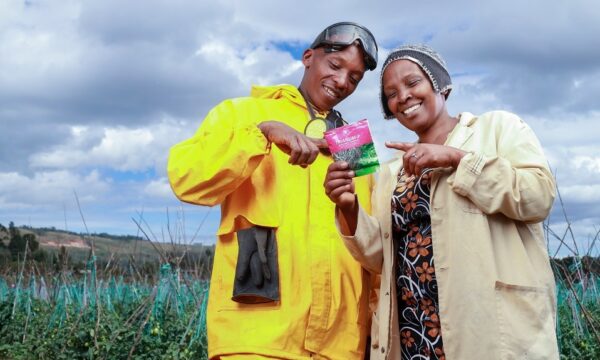
How would reducing pesticides affect productivity? (Photo: iStock Images)
A new UN report states that it is dangerously misleading to suggest that pesticides are necessary to achieve food security. Instead, the report recommends that farms reduce pesticide use and adopt sustainable practices that protect crops from pests by enhancing biodiversity and natural enemies. This agroecological approach eliminates reliance on, and exposure to, expensive and toxic chemical inputs, but would it really allow farmers to be just as productive?
As agriculture has intensified, the amount of pesticides used on land has increased dramatically to about 2 million tonnes per year worldwide. It is well known that these chemicals can have detrimental impacts on the environment, non-target organisms and human health, but they’re simple to apply and effective at treating the immediate problem so who can blame farmers for using them, when the alternatives can be complex and costly? In addition, there is a concern among farmers that reducing pesticide use will lower yields, which would be bad news for farm profitability and food security. However, a recent study in Nature Plants has found that reducing pesticide use doesn’t have to mean a reduction in productivity.
Lechenet et al. (2017) studied 976 commercial arable farms and found that 77% of them would not suffer yield loss after a reduction in pesticide use. Those farms that would suffer losses were ones growing high value-added crops that are heavily reliant on pesticides, such as potato and sugarbeet.
The team grouped farms by the constraints and opportunities they experience. They then looked into whether the farms in each group could maintain their productivity while reducing the amount of pesticide applied to the level of the farm in the group that used the least. The study estimated that 59% of these farms could reduce their use of pesticides by 42% without any negative effects on productivity or profitability. This 42% reduction in pesticide use corresponds to an average reduction of 37% for herbicides, 47% for fungicides and 60% for insecticides. Perhaps unsurprisingly, they also found that farms with higher pesticide use had a higher potential for pesticide reduction without adversely affecting farm productivity.
This study highlights the potential for a reduction in pesticide use without adversely affecting yield. However, the real challenge will be farmer uptake of the low-pesticide strategy as the benefit may not be increased yield, but rather no loss in yield, and risk adverse farmers are likely to continue with existing strategies rather than risk switching to low-pesticide methods.
Lechenet et al. (2017) conclude the study by highlighting the impact low-pesticide agricultural systems would have upon agricultural input markets and the landscape as a whole. These impacts need to be fully quantified and weighed up against the many impacts of continuing to apply the current levels of pesticides used every year around the world.
References
- United Nations (2017). Report of the Special Rapporteur on the right to food. Available online: https://documents-dds-ny.un.org/doc/UNDOC/GEN/G17/017/85/PDF/G1701785.pdf?OpenElement
- Lechenet M, Dessaint F, Py G, Makowski D, & Munier-Jolain N (2017). Reducing pesticide use while preserving crop productivity and profitability on arable farms. Nature plants, 3 PMID: 28248316
- Vasileiadis VP (2017). Economic sustainability: Less pesticide rarely causes loss. Nature plants, 3 PMID: 28248296
- Johnson, S. K. (2017) In France, farmers could cut pesticides without cutting profits. Ars Technica. https://arstechnica.com/?post_type=post&p=1052951
Related News & Blogs
The role of soil health in sustainable agriculture
Previously, we have discussed the importance of soil health for agriculture, highlighting its threats and outlining protection strategies. In this blog, we dig deeper into the role of soil health in sustainable agriculture and explore its long-term ben…
18 June 2025




